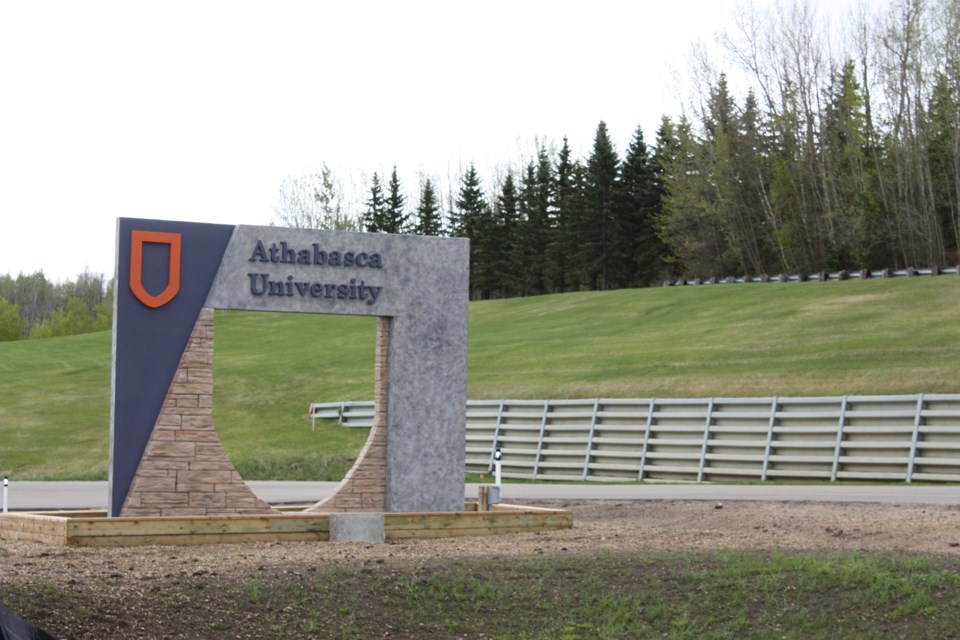ATHABASCA – Internships are meant to be a real-world experiences in a student's chosen field — sometimes that includes getting coffee for more senior colleauges, or taking notes for a mentor — but rarely, if ever, are they handed the opportunity to delve into the nuts and bolts of the job.
That is changing though. And quickly.
In an effort to prepare business students to be work-ready for the real-world, Athabasca University has partnered with Ametros Learning deployed by IBM Watson to create a first-of-its-kind virtual world – a business simulation using artificial intelligence – where learners are the consultants for an acquisition of a small company.
The Monet Bank ExecuTrac Work Experience co-op is specifically designed to be a more challenging process than the typical internship, explained Richard Dixon, a business professor at Athabasca University.
“What we have done is created a virtual environment. The students come in as management trainees in what we call the Monet Bank. And they're brought in because they're going to be doing an acquisition of another smaller FinTech; a financial technology company,” Dixon said.
The students start out as consultants for a virtual company and spend the first three weeks working with other students in teams evaluating three companies that AU's Faculty of Business and Ametros Learning co-created.
"They will look at the finances, the (human resource) practices, the cultural issues; they will look at accounting, they will look at strategic alignment and then they will make a presentation on these to the executive of the Monet Bank. In other words, they are presenting to IBM Watson.”
Watson is the name of IBM’s powerful “question-answering computer system capable of answering questions posed in natural language” according to the company's website.
What that means is, in the virtual world designed by AU and run through IBM Watson, students will email and instant message avatars who then respond and guide them through the process of acquiring the virtual company. ‘Guide’ sounds helpful, but the program has many twists and turns, Dixon said, all of which are based on real-life events. It’s these twists and turns that will make the students work-ready when they graduate.
“They're going to run into all kinds of issues. They're going to run into nepotism. They're going to run into plagiarism. For example, the marketing strategy that they're going to do – they just spent $2 million on the marketing strategy – and they find out it's been plagiarized. Now what do we do,” said Dixon, noting that students even have to fire someone.
He added that when students got to the plagiarism part of the simulation in December it happened to be the same day the Canadian Energy Centre – Alberta’s energy war room – announced it was changing its logo due to its chosen logo's similarity with another well-established brand.
The avatars the students interact with have names and back stories, Dixon said, and because of the power of IBM Watson they responded in such a realistic manner that students referred to them as people. One student even tried to get the program to fire one of the simulated bosses.
“He finished his self-evaluation paper ... went back in the simulation – it was still open – and tried to see if he could get his boss fired. He said, ‘I just hate this guy.’ I said, ‘You know this is a computer?’ He said, ‘Yeah, but I still hate him,’” Dixon said.
The applications for using AI to provide practical experience is endless, Dixon said, mentioning AU is working on a project with the Alberta Institute of Agrology to build a simulation that challenges the ethics of agrology professoinals.
“This is one where agrologists are put in a situation where the company has hired them to work on a well site reclamation – they are one of two groups in Alberta that are professionally allowed to sign off – and they are being asked to sign off on a well reclamation that the numbers were falsified,” said Dixon.
“What do you do with that? How do you deal with it? How do you respond? We finish the beta testing (this) week on that one and then it’ll be ready to go in the fall with the entire course of ethics for agrologists.”
As for AU’s simulation, as cutting edge as the program is, Dixon said AU students will, in the very near future, have an even more realistic experience with the avatars.
“The next iteration is going to be like talking to (Amazon) Alexa where you can actually just talk,” he said, adding that the AI learns, making it smarter and more realistic as more people take part.
Heather Stocking, TownandCountryToday.com
Follow me on Twitter @HLSox



